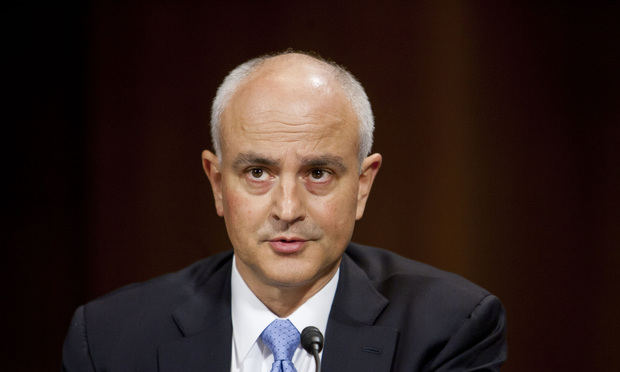Judge Overseeing $550M Facebook 'Tag Suggestions' Settlement Wants Details on Individual Payouts
Judge James Donato said at a hearing Thursday that he wants a clear explanation of why the proposed deal would pay less than the $1,000 statutory damages for negligent violations set by the Illinois Legislature in the Biometric Information Privacy Act. "The phrase litigation risk is not sufficient," he said. "Every case has litigation risk."
February 06, 2020 at 03:13 PM
4 minute read
 Judge James Donato of the U.S. District Court for the Northern District of California.
Judge James Donato of the U.S. District Court for the Northern District of California.
SAN FRANCISCO — The judge overseeing a proposed $550 million settlement that Facebook Inc. reached to settle claims that its "tag suggestions" feature violated an Illinois biometric privacy law has asked lawyers in the case to provide detailed explanations of why the deal would pay class members less than statutory damages amounts.
U.S. District Judge James Donato of the Northern District of California noted at a case management conference Thursday that the Illinois Legislature set statutory damages at $1,000 for negligent violations of the state's Biometric Information Privacy Act and $5,000 for intentional or reckless violations. Plaintiffs sued in 2015, claiming that the social media platform's "tag suggestions" feature, which prompts users to identify "friends" in photographs posted to the site, violated BIPA.
Donato said this case was "very different" than other consumer cases since there was "a clear mandate from the Illinois legislature that these violations had a price tag."
Donato also said that he wanted the settlement papers set to be filed on March 12 to explain what benchmark amount the parties had set for damages and the reason for any discount from that statutory amount.
"The phrase litigation risk is not sufficient," Donato said. "Every case has litigation risk."
Donato further noted that all his "key interpretations" in the case had been backed up by both the Illinois Supreme Court and the federal appellate courts. In January 2019, the Illinois Supreme Court in a case involving Six Flags agreed with a prior ruling from Donato in the Facebook case which found that plaintiffs don't need to allege any harm beyond a statutory violation to sue under BIPA.
The U.S. Court of Appeals for the Ninth Circuit in August upheld Donato's decision granting class certification in the case, finding that BIPA protected "the right not to be subject to the collection and use" of biometric identifiers such as face templates and that "these statutory requirements would necessarily violate the plaintiffs' substantive privacy interests." The U.S. Supreme Court last month declined to take up Facebook's appeal of the case.
Donato said Thursday that the parties have a "lot more information" than just his interpretations of the Illinois law.
"Just saying trials are risky is not going to fly with me," he said.
Donato also said that he wanted the parties to explain how Facebook has agreed to change its practices as part of the settlement. He said that's "particularly important" in cases where a company can afford to pay large fees that the company detail how it has changed its ways.
"I want to see something that says this is not going to happen again," Donato said.
Michael Rhodes of Cooley, who represented Facebook at the hearing, said that the March 12 deadline for filing settlement papers might be "aggressive" but that the parties could file a report saying what the holdups are if the deadline needs to be pushed back.
Shawn Williams of Robbins Geller Rudman & Dowd, who represented the plaintiffs at the hearing, said that he would be open to moving back the deadline by a week or two, but that he was hopeful that the parties would meet the self-imposed deadline.
Donato, for his part, told the parties that if they delay too long, he'll "most certainly set a trial date."
"This is already a 2015 case that has had a number of off-ramps and on-ramps," the judge said.
Read more:
Facebook Agrees to $550M Deal to Settle Biometric Suit Over 'Tag Suggestions'
Facebook's Facial Recognition Could Violate 'Privacy Interests,' Appeals Court Rules
Bumpy Ride for Six Flags: Biometrics Tactics Ruled Illegal in Illinois
This content has been archived. It is available through our partners, LexisNexis® and Bloomberg Law.
To view this content, please continue to their sites.
Not a Lexis Subscriber?
Subscribe Now
Not a Bloomberg Law Subscriber?
Subscribe Now
NOT FOR REPRINT
© 2025 ALM Global, LLC, All Rights Reserved. Request academic re-use from www.copyright.com. All other uses, submit a request to [email protected]. For more information visit Asset & Logo Licensing.
You Might Like
View All
White & Case KOs Claims Against Voltage LLC in Solar Companies' Trade Dispute


'A Death Sentence for TikTok'?: Litigators and Experts Weigh Impact of Potential Ban on Creators and Data Privacy

‘Extremely Disturbing’: AI Firms Face Class Action by ‘Taskers’ Exposed to Traumatic Content
5 minute readLaw Firms Mentioned
Trending Stories
- 1‘Catholic Charities v. Wisconsin Labor and Industry Review Commission’: Another Consequence of 'Hobby Lobby'?
- 2With DEI Rollbacks, Employment Lawyers See Potential For Targeting Corporate Commitment to Equality
- 3In-House Legal Network The L Suite Acquires Legal E-Learning Platform Luminate+
- 4In Police Shooting Case, Kavanaugh Bleeds Blue and Jackson ‘Very Very Confused’
- 5Trump RTO Mandates Won’t Disrupt Big Law Policies—But Client Expectations Might
Who Got The Work
J. Brugh Lower of Gibbons has entered an appearance for industrial equipment supplier Devco Corporation in a pending trademark infringement lawsuit. The suit, accusing the defendant of selling knock-off Graco products, was filed Dec. 18 in New Jersey District Court by Rivkin Radler on behalf of Graco Inc. and Graco Minnesota. The case, assigned to U.S. District Judge Zahid N. Quraishi, is 3:24-cv-11294, Graco Inc. et al v. Devco Corporation.
Who Got The Work
Rebecca Maller-Stein and Kent A. Yalowitz of Arnold & Porter Kaye Scholer have entered their appearances for Hanaco Venture Capital and its executives, Lior Prosor and David Frankel, in a pending securities lawsuit. The action, filed on Dec. 24 in New York Southern District Court by Zell, Aron & Co. on behalf of Goldeneye Advisors, accuses the defendants of negligently and fraudulently managing the plaintiff's $1 million investment. The case, assigned to U.S. District Judge Vernon S. Broderick, is 1:24-cv-09918, Goldeneye Advisors, LLC v. Hanaco Venture Capital, Ltd. et al.
Who Got The Work
Attorneys from A&O Shearman has stepped in as defense counsel for Toronto-Dominion Bank and other defendants in a pending securities class action. The suit, filed Dec. 11 in New York Southern District Court by Bleichmar Fonti & Auld, accuses the defendants of concealing the bank's 'pervasive' deficiencies in regards to its compliance with the Bank Secrecy Act and the quality of its anti-money laundering controls. The case, assigned to U.S. District Judge Arun Subramanian, is 1:24-cv-09445, Gonzalez v. The Toronto-Dominion Bank et al.
Who Got The Work
Crown Castle International, a Pennsylvania company providing shared communications infrastructure, has turned to Luke D. Wolf of Gordon Rees Scully Mansukhani to fend off a pending breach-of-contract lawsuit. The court action, filed Nov. 25 in Michigan Eastern District Court by Hooper Hathaway PC on behalf of The Town Residences LLC, accuses Crown Castle of failing to transfer approximately $30,000 in utility payments from T-Mobile in breach of a roof-top lease and assignment agreement. The case, assigned to U.S. District Judge Susan K. Declercq, is 2:24-cv-13131, The Town Residences LLC v. T-Mobile US, Inc. et al.
Who Got The Work
Wilfred P. Coronato and Daniel M. Schwartz of McCarter & English have stepped in as defense counsel to Electrolux Home Products Inc. in a pending product liability lawsuit. The court action, filed Nov. 26 in New York Eastern District Court by Poulos Lopiccolo PC and Nagel Rice LLP on behalf of David Stern, alleges that the defendant's refrigerators’ drawers and shelving repeatedly break and fall apart within months after purchase. The case, assigned to U.S. District Judge Joan M. Azrack, is 2:24-cv-08204, Stern v. Electrolux Home Products, Inc.
Featured Firms
Law Offices of Gary Martin Hays & Associates, P.C.
(470) 294-1674
Law Offices of Mark E. Salomone
(857) 444-6468
Smith & Hassler
(713) 739-1250






